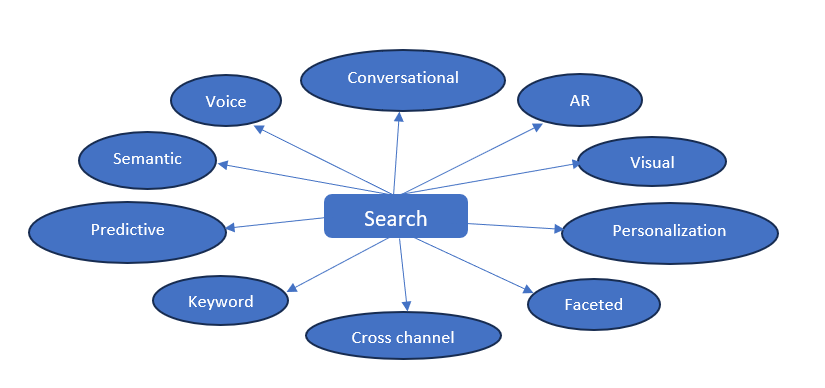In the dynamic realm of digital commerce, the integration of AI into search functionalities has ushered in a transformation era. AI powered search engines have become the driving force behind enhanced user experiences, improved product discoverability and increased conversion rates. By using advanced algorithms and technologies, AI-powered search engines can understand the context and intent of natural language queries and deliver relevant and personalized results. This enhances the online shopping experience for customers and provides a competitive edge for e-commerce businesses. In this blog, we will explore how AI-powered search transforms the landscape of digital commerce, and what are the key components and challenges of this technology.
The evolution of search in digital commerce has undergone significant transformations, reflected technological advancements, and changed user expectations.

AI powered search in digital commerce relies on various components to enhance accuracy, relevance, and overall user experience. Here are key components:
NLP: Understands and interprets user queries in natural language. Enables more human-like interactions enhancing the user’s ability to articulate search queries conversationally.
Machine learning Algorithms: Analyze user behavior preferences and historical data to predict and personalize search results. Improves the relevance of search results by tailoring them to individual user preferences.
Ranking Algorithms: Determine the order in which search results are displayed based on relevance and user context. Ensures that the most relevant products or information appear at the top, optimizing the user experience.
Faceted search and filtering provide users with the ability to refine search results through filters like price brand size and other attributes. Enables users to narrow down their options quickly, improving the efficiency if the search process.
Predictive Analytics: Anticipates user intent based on historical data and predicts likely search queries. Reduces search time and enhances the overall user experiences by offering relevant suggestions before users complete their queries.
Image recognition: Allows users to search for products using image rather than text. Enhances the search experience by providing a more intuitive way to find products, especially useful for visually oriented queries.
Personalized engines: Create personalized user experiences by tailoring search results based on individual preferences, browsing history, and purchase behavior. Increases user engagement and conversation rates by presenting products or content that align with user’s interest.
Chatbots and Virtual Assistants: Integrate conversational interfaces to help users with search queries and provide real time assistance. Enhances user engagement by offering interactive and immediate support within the search interface.
Cross channel integration: Ensures a consistent search experience across various channels such as websites mobile apps and social media platforms. Provides a seamless transition for users moving between different digital touchpoints maintaining a unified and user-friendly search experience.
Augmented Reality: integrates AR capabilities to allow users to visualize products in real world settings. Bridges the gap between online and offline shopping experiences offering amore immersive way to explore and evaluate products.
The synergy of these components empowers AI driven search in digital commerce to deliver efficient personalized and contextually relevant results ultimately enhancing user satisfaction and driving business success. AI-powered search optimizes pricing strategies by using dynamic pricing algorithms that adjust prices in real-time based on demand, supply, and competition. This means that the prices of products or services are not fixed but change according to the market conditions and customer behavior. AI-powered search enhances product discovery and improves search relevance by analyzing customer data and behavior and learning from past interactions. This means that AI-powered search uses artificial intelligence algorithms to understand the user’s needs and preferences and provide the most accurate and relevant results for each query. AI-powered search improves customer engagement and loyalty by using conversational AI and automated customer service to provide fast and accurate responses, and personalized recommendations. This means that AI-powered search uses artificial intelligence algorithms to interact with customers in natural language, and provide them with relevant information, solutions, and suggestions.
AI powered search plays a crucial role in enhancing user experience and driving sales. Here are some examples.
Personalized search recommendation: AI algorithms analyze user behavior purchase history and preferences to provide personalized search recommendations. For instances if a customer frequently purchases running shoes, the search results will prioritize such products.
Visual search: AI enables Visual search capabilities, allowing users to upload images or use their device cameras to search for products. This is particularly benefits for fashion and home décor, where users can find similar items based on the visual attributes of a desired product.
AI algorithms dynamically adjust facets and filters based on user interactions ensuring that search results remain relevant and adaptable. This helps users narrow down their choices and find products that align with their specific criteria.
Voice search Integration: AI powered voice search enhances user convenience, allowing customers to verbally express their search queries. Voice recognition technology and AI algorithms work together to understand spoken language and provide accurate search results.
Behavioral Analysis for Ranking: AI analyzes user interactions and behaviors on the platform to adjust search result rankings. Popular and relevant products receive higher visibility improving the chances of conversion.
Automated Merchandising: AI helps in automating merchandising strategies by analyzing trends, inventory levels and customer preferences. This ensures that the most relevant and profitable products are prominently featured in search results.
These AI powered search capabilities collectively contribute to a more seamless and personalized shopping experience. Ultimately driving customer satisfaction and loyalty in the digital commerce industry.
Challenges of AI powered search in Digital commerce
Data privacy concerns: Utilizing AI for personalized recommendations requires extensive user data raising concerns about privacy and data security.
Algorithmic Bias: AI algorithms may inadvertently reflect biases present in training data leading to skewed search results that may not cater to diverse user preferences.
Initial Implementation Costs: Implementing AI powered search systems involves upfront cost for technology integration, training and infrastructure which can be a challenge for smaller businesses.
Continuous maintenance and updates: AI systems require ingoing maintenance to stay effective. Regular updates and monitoring are essential to address evolving user behavior and industry trends.
Integration challenges: Integrating Ai-powered search seamlessly with existing e commerce platforms may pose technical challenges, especially for business with legacy systems,
User Adoption and understanding users might need time to adapt to AI driven search features and there may be a learning curve in understanding and utilizing advanced search functionalities.
Balancing Personalization is valuable: While personalization is valuable there’s a challenge in striking a balance to ensure users also encounter new and diverse products preventing narrowing of their choices.
Addressing these challenges requires a thoughtful and strategic approach combining technological solutions with a commitment to ethical AI practices and ongoing improvement efforts. AI powered search enhances the online shopping experience for customers and provides a competitive edge for e-commerce businesses. This can help e-commerce businesses optimize their pricing strategies, automate their customer service, streamline their inventory management, and improve their search capabilities. AI-powered search can also help customers discover products that match their needs and preferences and increase their satisfaction and loyalty. AI-powered search is transforming the landscape of digital commerce and creating a smarter and more convenient way to shop online.











